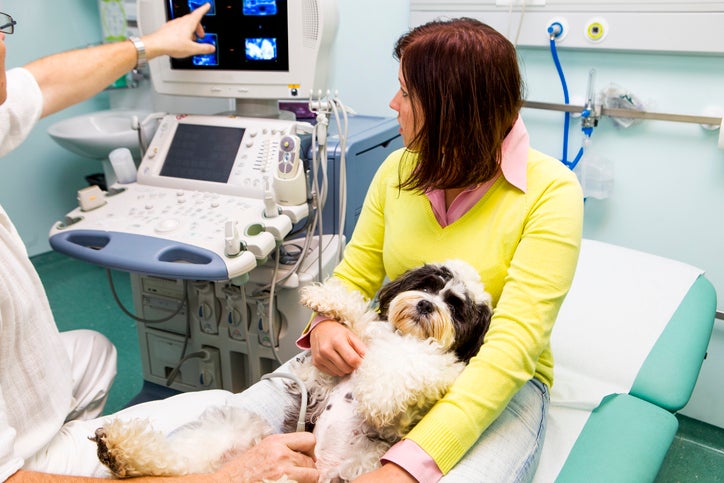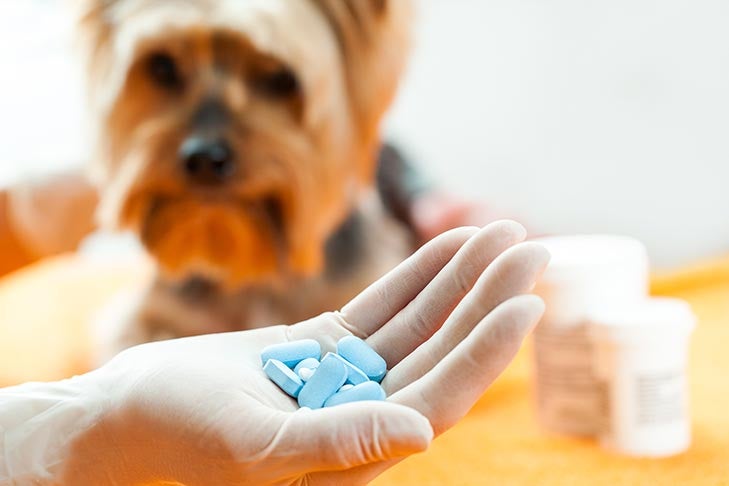Your vet says your dog has IBD. Or was it IBS? The two terms can be confusing. IBS stands for Inflammatory Bowel Syndrome and IBD for Inflammatory Bowel Disease. The term IBS is rarely used in veterinary medicine. IBD, on the other hand, is a common condition in dogs.
To complicate matters further, both IBD and IBS are syndromes rather than diseases. “IBD is caused by a specific inflammatory reaction to chronic irritation of the intestinal tract,” Dr. Jerry Klein, Chief Veterinary Officer for the AKC, explains. “Whatever the underlying cause, the result is that the lining of the intestine is invaded by inflammatory cells. An allergic-type response then occurs within the intestinal tract. This inflammation interferes with the ability to digest and absorb nutrients. Most dogs with IBD have a history of recurrent or chronic vomiting and/or diarrhea and may have a poor appetite.”

Like IBD, IBS is often characterized by diarrhea, vomiting, and weight loss. But unlike IBD, IBS tends to be associated with anxiety or stress. Dog IBS does not result in chronic inflammation, intestinal bleeding, or permanent intestinal damage. Nonetheless, it is uncomfortable and even debilitating for affected dogs.
Causes of Inflammatory Bowel Disease in Dogs
A genetic component in humans with IBD is well-documented, and a yet-undiscovered genetic component may exist in dogs. The fact that certain breeds are more susceptible to certain types of chronic digestive problems further supports this theory. For example, research has shown that the Norwegian Lundehund, Soft Coated Wheaten Terrier, Yorkshire Terrier, German Shepherd Dog, Boxer, and French Bulldog are more at risk of certain gastrointestinal problems compared to other breeds. In Boxers, it appears that a genetic mutation may render them less able to kill off bacteria like Escherichia coli (E. coli). In German Shepherd Dogs, another mutation appears to be involved.
But other causes could also be at work. The immune system plays a large role in most cases of IBD. The intestinal walls may become inflamed, or when the immune response doesn’t stop working in response to pathogens breaking through.
With IBD, imbalances in gut health are common. These may occur in response to antibiotics, which kill off both good and bad bacteria. Accumulating evidence in human IBD and animal models suggests that these gut imbalances can contribute to chronic intestinal inflammation. Recent IBD studies have also shown that dogs with IBD have distinctly different duodenal microbial communities compared to healthy dogs.
While these factors may contribute to IBD, many other dogs experience them and never develop IBD. In some cases, they may cause only temporary disturbances, and may even be labeled as IBS.
How is IBD in Dogs Diagnosed?
Diagnosis of either IBS or IBD in dogs starts with ruling out other possible diseases. “While in many cases an exact underlying cause cannot be identified as the inciting cause of IBD, items to rule out as possible causes include parasitic or bacterial infection and notably adverse reaction to a specific protein in the diet,” Dr. Klein says.
The first step is often bringing a poop sample to your vet to have them look for infectious organisms. Often, a dog may receive deworming medication, even if the fecal test results are negative.
Bloodwork
Bloodwork can reveal problems in organs such as the pancreas or liver. “Gastrointestinal panels include measurement of the level of vitamin B12–cobalamin–in the blood to indicate whether there is decreased ability to absorb nutrients,” Dr. Klein says, “and measurement of folate in the blood to indicate whether there is an imbalance in the normal bacterial populations in the GI tract.” They may also be suggestive of other causes of bowel diseases, such as protein-losing enteropathy (PLE), pancreatic exocrine insufficiency, and lymphocytic plasmacytic gastroenteritis.
Ultrasounds
Ultrasounds or radiographs may help rule out other causes for GI distress, including foreign bodies, intestinal blockages, or growths due to cancer, fungal diseases, or pythiosis (an infectious disease similar to some fungal infections). They may also detect enlarged organs that could indicate organ dysfunction. Ultrasound may be able to pinpoint thickened tissue regions that may indicate inflamed areas in the intestinal walls.

Intestinal Biopsy
The gold standard for diagnosis is a biopsy of the intestinal or stomach lining, especially of any thickened areas. This will require general anesthesia and either an endoscopic procedure or surgical procedure, depending on what area is suspected to be involved. The biopsy will confirm the presence of inflammatory cells indicative of IBD and show how severe the condition is. “The benefit of exploratory surgery is that full-thickness biopsies often provide better samples to make an accurate diagnosis,” says Klein.
Ruling Out Other Causes
IBS may be the diagnosis if these procedures all yield negative results. The most important distinction is that IBD is a chronic condition, with GI signs lasting for more than three weeks, and for which other causes can’t be found. You may suspect your dog’s signs are more likely due to IBS if they tend to occur only in stressful situations. You can ask your veterinarian whether an anti-anxiety medication might be right for your dog.
Sometimes a change in diet will improve signs of IBS. The final part of diagnosing IBS is with a diet trial, in which the dog eats a restricted diet usually consisting of novel proteins not in the former diet.
Treatments for Dog IBD
Treatment can involve diet, medications, and supplements. “Not all dogs respond to the same medication or food, so a series of drugs and/or foods may be necessary,” cautions Klein. “The ideal way to treat this problem is to diagnose the underlying disease that is causing the reaction.”

Diets
Most treatment, especially for mild cases, begins with specialized diets. “The use of diets, novel diets versus hydrolyzed protein diets, are often a mainstay in the management of IBD in most dogs and cats,” says Klein. “These diets contain a single protein source that is new to the dog—what is referred to as a novel protein—or a hydrolyzed protein—where it has been broken down to smaller parts, so the body does not recognize it as a specific protein. A true food trial requires that the prescribed diet be fed exclusively for eight to twelve weeks. In all food trials, no treats or other foods may be given at all. If these food trials are unsuccessful, a high-fiber diet may be recommended.”
In more severe cases, or if diet alone does not control the problem, medications may be added to the treatment protocol. Klein suggests talking to a board-certified veterinary internist and having them guide treatment in these patients.
Medications
Medications can be of several types. “Antibiotics, such as metronidazole—Flagyl—may be prescribed for their anti-inflammatory effect on the GI tract,” says Klein. “Immunosuppressive medications, such as corticosteroids, can be used but are used with caution because they have the potential for side effects. Corticosteroids will likely obscure the definitive diagnosis of the disease if biopsies have not already been taken. Other medications, such as chlorambucil—Leukeran—or azathioprine—Imuran—are tried if corticosteroids are not successful on their own.”

Supplements
Supplements may also help. Some dogs profit from the addition of probiotics (specifically VSL#3) in their diets. Supplementation with Vitamin B12 (cobalamin) can be considered, as most dogs with IBD are unable to absorb this important vitamin.
Some holistic veterinarians advocate adding enzymes, glutamine, and herbs such as marshmallow root to the dog’s diet, plus detoxification with homeopathic remedies and herbs such as milk thistle. However, Dr. Klein doesn’t believe enough peer-reviewed scientific studies exist on these supplements to evaluate their effectiveness for IBD.
Researching the Most Effective Treatments
Because IBD may have several different causes, treatment is often on a trial-and-error basis for each individual dog. Understanding the causes of IBD may lead to better-targeted therapy. Recent IBD research funded by the AKC Canine Health Foundation found that in Boxers with E. coli identified in biopsy samples, antimicrobial treatment to get rid of the bacteria was associated with positive outcomes in more than 80% of cases.
While IBD will likely require lifelong treatment to some extent, IBS may require only intermittent treatment, as signs tend to come and go. If the IBS is related to stress, it’s obvious that preventing your dog from becoming anxious is a good idea. If the dog must be in a stressful situation, ask your veterinarian for suggested remedies or approaches to anti-anxiety treatment. Eliminating any foods connected with the condition is also an obvious solution. Some dogs may need to stay on a special diet for the rest of their life, whereas others may need only intermittent treatment according to symptoms.
The post IBD and IBS in Dogs: Signs, Symptoms, and Treatment appeared first on American Kennel Club.



0 Comments
Recommended Comments
There are no comments to display.